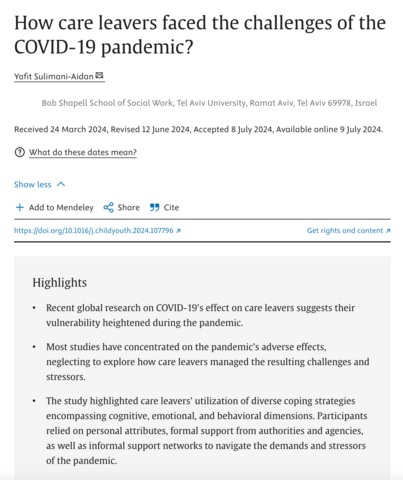Highlights
- Recent global research on COVID-19’s effect on care leavers suggests their vulnerability heightened during the pandemic.
- Most studies have concentrated on the pandemic’s adverse effects, neglecting to explore how care leavers managed the resulting challenges and stressors.
- The study highlighted care leavers’ utilization of diverse coping strategies encompassing cognitive, emotional, and behavioral dimensions. Participants relied on personal attributes, formal support from authorities and agencies, as well as informal support networks to navigate the demands and stressors of the pandemic.
- Participants found their existing personal skills valuable in managing COVID-19 stressors. Additionally, they viewed their future expectations and goals as both a source of motivation and a coping mechanism.
Abstract
The COVID-19 pandemic has had multiple implications for the lives of care leavers, an already marginalized population. Although there has been a focus in the literature on the negative implications of the pandemic, and on the heightened risks and needs among this cohort, little attention has been paid to their resilience and to the way in which care leavers have coped.
Based on resilience theory and conservation of resources (COR) theory, in this study the authors explored the coping resources and assets of care leavers during and following the pandemic from the perspective of 44 care leavers in Israel aged 18–29. Thematic analysis revealed four main themes: reliance on their own personal features and skills, future perceptions as a motivational aspect, past and current support from formal services and figures, and support from informal social networks. The findings indicate that the pandemic has offered a unique lens through which to consider care leavers’ strengths and resilience.
Implications for policy and practice include highlighting the role of the state as a “corporate parent” in providing protection against the pandemic’s negative implications and emphasizing the importance of formal services and professional figures as central sources of support in care leavers’ coping and resilience.

